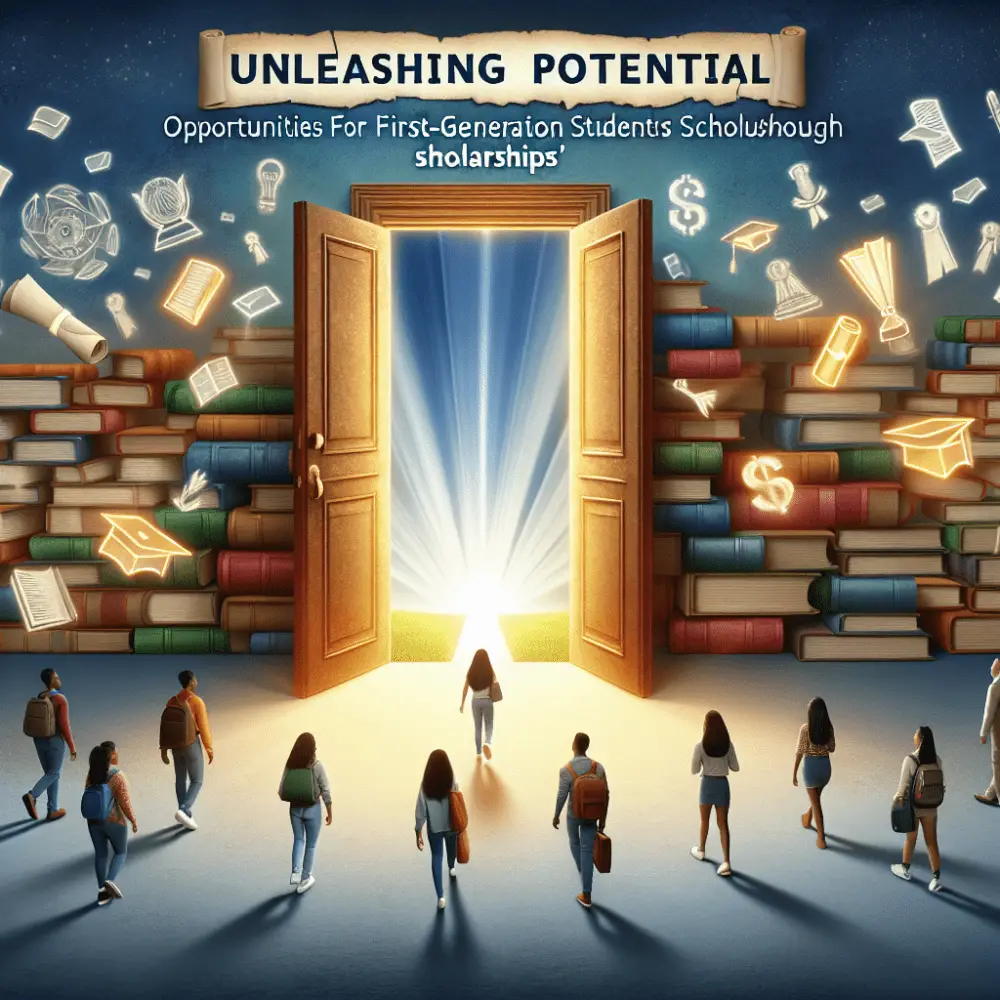
Introduction:
Education is often seen as the key to unlocking one’s potential and opening up a world of opportunities. However, for first-generation students, the path to higher education can be filled with challenges and obstacles. Limited financial resources, lack of guidance, and unfamiliarity with the college application process can make it difficult for these students to navigate their way through the system. Fortunately, scholarships provide a glimmer of hope for first-generation students by easing the burden of tuition fees and creating opportunities for academic and personal growth. In this article, we will explore how scholarships can unleash the potential of first-generation students, empowering them to achieve their dreams.
The Power of Scholarships:
Scholarships are financial awards that are given to students based on various criteria such as academic excellence, extracurricular achievements, or financial need. They provide much-needed funding for education expenses like tuition fees, books, accommodation, and other related costs. For first-generation students who may come from disadvantaged backgrounds, scholarships pave the way towards a brighter future by eliminating financial barriers.
By providing access to higher education opportunities that would otherwise be unaffordable, scholarships empower first-generation students to pursue their passions and talents. They level the playing field by ensuring that financial circumstances do not limit a student’s potential or hinder their ability to succeed academically. Scholarships create an environment where talent and dedication are valued over financial capabilities.
Enhancing Academic Success:
First-generation students who receive scholarships are more likely to stay in school and graduate compared to those without financial assistance. A study conducted by The Pell Institute found that scholarships substantially increase college completion rates among low-income students.
With the financial burden alleviated through scholarships, these students can fully focus on their studies without worrying about how to make ends meet. This allows them to invest their time and energy into academic pursuits, resulting in improved learning outcomes and increased chances of success.
Besides monetary support, scholarships often come with additional benefits such as mentoring programs, tutoring services, and access to resources that are specifically tailored to the needs of first-generation students. These support systems play a crucial role in helping these students overcome challenges and navigate the complexities of college life.
Expanding Horizons:
One of the greatest advantages of scholarships for first-generation students is the exposure and opportunities they provide. Scholarships can open doors to experiences like internships, study abroad programs, conferences, and networking events. These opportunities allow first-generation students to broaden their horizons, develop new skills, and make valuable connections within their chosen fields.
Through internships, students gain real-world experience that enhances their employability after graduation. Many scholarship programs also offer mentorship opportunities where students are paired with professionals who provide guidance and advice on career paths. This mentorship acts as a valuable resource for first-generation students who may be unfamiliar with navigating the job market.
The Ripple Effect:
When a first-generation student receives a scholarship, the impact goes beyond individual success. It creates a ripple effect that extends to their families and communities. As these students pursue higher education and achieve their goals, they become role models for their siblings, peers, and future generations.
The success stories of first-generation scholarship recipients inspire others to believe in their own potential and take steps towards pursuing higher education. By breaking the cycle of limited access to education within families, scholarships have the power to transform communities by promoting upward mobility and social change.
FAQ:
1) How do I find scholarships for first-generation students?
There are several resources available to help you find scholarships specifically designed for first-generation students. Start by checking with your high school guidance counselor or college admissions office for any local or institution-specific scholarships. Additionally, there are various online scholarship databases that allow you to search for scholarships based on your eligibility criteria.
2) What are some tips for applying to scholarships?
When applying for scholarships, it is important to carefully read and follow the instructions provided. Pay attention to deadlines and ensure that you meet all the eligibility requirements. Take the time to tailor your application essays and personal statements to each scholarship’s specific requirements. Lastly, be proactive in seeking out letters of recommendation and gathering any necessary supporting documents.
3) Can I apply for multiple scholarships?
Absolutely! In fact, it is encouraged to apply for as many scholarships as you are eligible for. By diversifying your applications, you increase your chances of receiving financial assistance. However, make sure you carefully manage your time and prioritize applications based on deadlines.
4) Are there scholarships available specifically for graduate-level studies?
Yes, there are scholarships available for graduate-level studies as well. Many universities, foundations, and organizations offer scholarships exclusively for graduate students. Make sure to research and explore these opportunities within your field of study.
5) What other sources of financial aid should I consider?
In addition to scholarships, it is important to explore other sources of financial aid such as grants, work-study programs, and student loans. Talk to a financial aid advisor at your college or university who can guide you through the process of accessing these resources.
Conclusion:
Scholarships have the power to unleash the potential of first-generation students by providing them with access to education, financial support, and valuable opportunities. These scholarships not only empower individuals to achieve their dreams but also create a ripple effect that positively impacts families and communities. By investing in the potential of first-generation students, scholarships pave the way for a brighter future and a more inclusive society.












